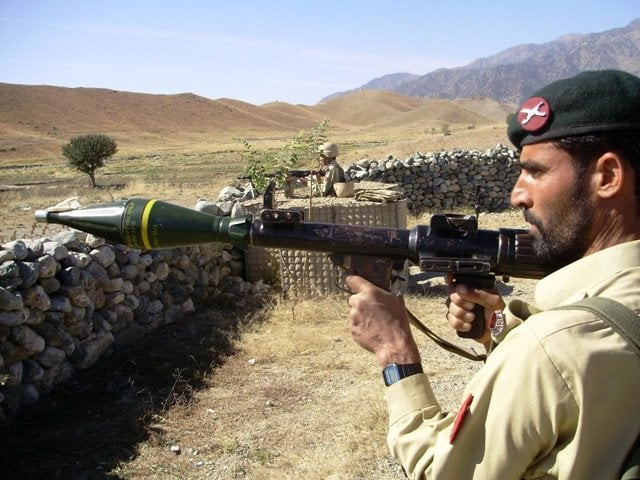Attacks on the state
The state's incapacity to arrest and tackle the terror networks has been once again badly exposed.

A file photo of Pakistani soldiers. PHOTO: fILE
The Pakistani state’s ability to counter terrorism has been on the decline. In particular, the role of intelligence agencies tasked with the responsibility of timely information and advice to executive authrorities has come under public scrutiny because of their persistent inability to pre-empt terrorist attacks.

In most cases, the Tehreek-e-Taliban Pakistan (TTP) and the Lashkar-e-Jhangvi (LeJ) have accepted responsibility for these attacks. Baloch separatists, who, as the state holds, are aided by foreign elements, carried out the attack on the Quaid’s residency in Ziarat. In Quetta, women students were attacked and killed and then the nation witnessed most brutal attacks on a hospital and its staff. In Khyber-Pakhtunkhwa, the TTP bombed a funeral and carried out attacks against the security personnel almost with an impunity that makes the Pakistani state appear as clueless. The most ghastly incident took place at the scenic Nanga Parbat where foreign tourists were attacked and killed, alarming the entire world about the security crisis in Pakistan. Most recently, a senior judge of the Sindh High Court was attacked and nine people were killed. Karachi has become a hub of terror networks, which endangers the economic future of Pakistan.
Three trends are clear from these acts of violence: the TTP, its allies and al Qaeda have accelerated their attack on the Pakistani state and society even when political parties that won the recent election have been stating that they are ready to talk to them. Second, the operations of the LeJ — largely based in Punjab — continue unabated, thereby giving much impetus to the TTP’s agenda. Finally, the civilian governments lack coordination and are yet to assume the real charge of security as stipulated by the Pakistani Constitution.
The interior minister has made some strong statements hinting at the plans to devise a new security policy. However, no security policy can be effective or in civilian control until the armed forces are on board and are willing to accept civilian input. Furthermore, our domestic security is linked to the foreign policy goals in Afghanistan and India, which historically have required the Pakistani state to overly rely on proxies in the shape of private militias. This is where the rot has originated for it has broken the state’s monopoly over the legitimate use of violence. The situation is further exacerbated by the existence of areas such as parts of Fata and Balochistan and elsewhere where the state institutions are weak or absent altogether.
The new federal and provincial governments, therefore, need to work on a multi-pronged strategy. It is time that they ended their election rhetoric of winning terrorists through peace talks and identified the grave threat to Pakistan. They need to build public campaigns among their constituents and through state institutions for a medium- to long-term fight against terrorism and extremism, which breeds the former.
The federal government needs to involve parliamentary committees in the process of building a consensus on the contours of a new security policy, which resolves to tackle the militias through various means which could include plans to reintegrate the militants.
Pakistan’s ambitions for the post-Nato Afghanistan need to be revisited and talks with India must be held at once to end the proxy battle that lies ahead for winning influence in the war-ravaged country.
In Karachi and other areas, where state institutions need capacity, resources must be diverted for civilian law enforcement without further delay. Civil-military imbalance will not go away soon so pragmatism demands that the new government finds a way of working with the military within the legal ambit instead of moving towards institutional conflict that may sabotage the prospect of a much-needed consensus.
Published in The Express Tribune, July 1st, 2013.
Like Opinion & Editorial on Facebook, follow @ETOpEd on Twitter to receive all updates on all our daily pieces.















COMMENTS
Comments are moderated and generally will be posted if they are on-topic and not abusive.
For more information, please see our Comments FAQ